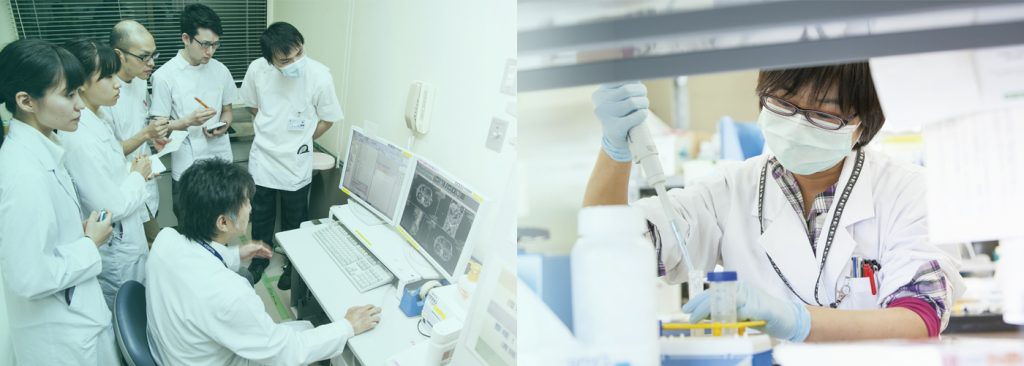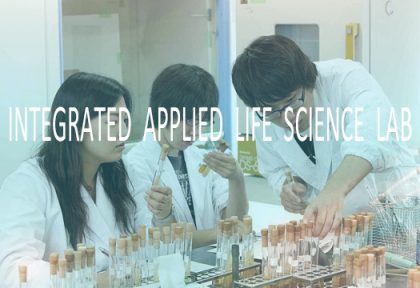統合応用生命科学専攻(生命医科学コース)

理念・目的
生命科学を学術の共通基盤とする農学分野の「生命農学コース」、医学分野の「生命医科学コース」、工学分野の「生命工学コース」の3コースが「健康」を共通のキーワードとして連携して教育を行い、医工農の3分野を俯瞰する視野を持ち、各分野の知識と技術を「統合・応用」して技術革新を行い、人類にとって最も普遍的な価値をもつ「健康」に関する課題に対して複数の解決法を見いだし、社会の発展及び人類の福祉に貢献する高度専門職業人及び研究者の養成を目指します。
学位授与方針(ディプロマポリシー)
統合応用生命科学専攻
学生は大学院医工農学総合教育部の理念及び統合応用生命科学専攻のカリキュラムポリシーに沿って学修し、各コースが設定した履修基準に基づき合計 14 単位以上を修得した上で、学位論文審査及び最終試験を受けます。論文審査委員会は、統合応用生命科学専攻の各コースが以下に掲げるディプロマポリシーに基づき、博士論文の内容と最終試験の結果を評価します。その結果、「合格」と判定された学生に博士の学位を授与します。
生命医科学コース
生命医科学コースの履修基準を満たし、微生物、動植物、及びヒトの生命現象を分子、細胞、組織、及び個体の各レベルで理解する生命科学の基盤を有し、医工農の3分野を俯瞰する視点と「健康」に関する課題に対応可能な見識を持ち、疫学や神経科学を中心にその周辺分野を含む高度な医科学の専門知識と技術を身につけ、学位論文の審査及び最終試験に合格した学生に「博士(生命医科学)」の学位を授与します。 ① 社会医学(疫学)、神経科学、病態医科学等の高度な専門知識と技術を修得するとともに、医学全般の広範な知識を修得している ② 専門知識と技術を応用し、健康の増進、疾病の予防・治療戦略を考えることができる実践力を有している ③ 医学、工学、農学、看護学等の多角的観点から医療に関わるさまざまな課題に対応できる能力を有している ④ 高度専門職業人あるいは研究者として必要なグローバルコミニュケーション能力を修得している
教育課程編成・実施方針(カリキュラムポリシー)
統合応用生命科学専攻
本専攻では、農学・医学・生命工学の共通基盤となる生命科学の統合的な知識と俯瞰的視野を修得させるため専攻共通科目として「統合応用生命科学特論」を、共通テーマである「健康」に関する理解を深めるために「ヘルスサイエンス特論」を設定するとともに、コース専門科目の分野横断的な履修を可能としています。また、4年制医学系専攻や工学系専攻が開講する専門科目のうち、本専攻の学生に履修を推奨する科目を関連科目として指定しています。これによって、医工農の3分野を俯瞰する視野を身につけさせ、各分野の知見と技術の「統合力」と「応用力」を涵養します。
学生の学修成果は、シラバスに明記された評価方法及び評価基準に基づいて、授業の到達目標への到達度により評価します。
<評価方法>
・講義科目においては、理解度を確認する筆記試験、レポート及び小テスト、受講態度などにより、到達度を判定します。
・演習、実験、実習、実技科目においては、筆記試験、レポート及び小テストに加え、参加度や発表内容、実技等を通じて、到達度を判定します。
学位論文については、厳格で透明な論文審査を行います。
生命医科学コース
生命医科学コースでは、生命科学の基盤と医工農の3分野を俯瞰する知識を修得させるために、専攻共通科目「統合応用生命科学特論」及び「ヘルスサイエンス特論」を必修とした。生命工学コースや生命農学コースの専門科目を履修可能としており、「個体発生期の生命」、「食」や「栄養学」などを学ぶことができる体制を整え、「健康」をキーワードに医工農の分野横断的な知識の修得を図ります。コース専門科目では、医学専攻(4年制博士課程)、看護学を中心としたヒューマンヘルスケア学専攻とも連携し、「医学・看護学共通科目」を設け、2単位を必修としました。ここには「医療データ解析・臨床疫学特論Ⅰ」「神経科学特論」など疫学と神経科学の科目の他に、一般的な基礎医学、臨床医学の科目、健康を主なテーマにした科目が含まれ、実践的な生命科学分野の知見、解析技術を修得させます。これにより、多角的観点から健康に関わる様々な課題に対応するうえで役に立つ、医学・生命工学・農学を統合した知見を身につけた人材を養成することができます。
入学者受入方針(アドミッションポリシー)
統合応用生命科学専攻
育成目標
生命科学を学術の共通基盤とする農学分野の「生命農学コース」、医学分野の「生命医科学コース」、工学分野の「生命工学コース」の3コースが「健康」を共通のキーワードとして連携して教育を行い、医工農の3分野を俯瞰する視野を持ち、各分野の知識と技術を「統合・応用」して技術革新を行い、人類にとって最も普遍的な価値をもつ「健康」に関する課題に対して複数の解決法を見いだし、社会の発展及び人類の福祉に貢献する高度専門職業人及び研究者の養成を目指しています。
求める能力・人物像
農学、医学、生命工学の3分野は生命科学を学術研究の基盤とし、連携して現代社会の諸問題、とりわけ人類にとって最も普遍的な価値をもつ「健康」を主要テーマとして教育研究を行います。本専攻ではこのような理念に共鳴し、最新の生命科学の知見に基づき医工農分野の知識と技術の「統合力」を身につけた高度専門職業人及び研究者として社会に貢献する志のある学生を求めています。
生命医科学コース
育成目標
生命現象を分子、細胞、組織及び個体の各レベルで理解する生命科学の基盤を有し、医工農の3分野を俯瞰する視点と「健康」に関する課題に対応可能な見識を持ち、疫学や神経科学を中心とした学問分野の高度な専門知識と技術を身につけ、医療機関等で活躍できる高度専門職業人及び研究者の育成を目指しています。
求める能力・人物像
疾病の発生機序とその予防・治療戦略を探求する意欲があり、社会医学、病態医科学及び神経科学等の基礎医学の知識と技術を深めるとともに、医学、工学、農学、看護学等の多角的観点を持ち、医療に関わるさまざまな課題に対応することによって、地域及びグローバル社会において人々の健康の増進に貢献する志のある学生を求めています。
試験区分別の入学者選抜の基本方針
上記の<求める能力・人物像>で示す能力等を有する人を評価するため、以下の方法により選抜します。
<一般選抜>
筆記試験(英語)、口述試験、出身大学大学院等の成績証明書の審査結果を総合して判定し、合格者を決定します。
<外国人留学生特別選抜>
筆記試験(英語)若しくは外部英語スコア、口述試験、出身大学大学院等の成績証明書の審査結果を総合して判定し、合格者を決定します。
Doctor’s Course
Department of Integrated Applied Life Science
Biomedical Science Course
Philosophy/Goal
The Department of Integrated Applied Life Science (Biomedical Science Course) provides education with cooperation by three courses; the Life Agriculture Course as an agricultural field that assumes life science as a common foundation for learning, the Biomedical Science Course as a medical field and the Biotechnology Course as an engineering field. Each of those courses considers “health” as a common keyword in order to nurture highly skilled professionals and researchers who have a comprehensive perspective to grasp three fields, medicine, engineering and agriculture; integrate and apply knowledge and technology from three fields to encourage innovation; discover multiple ways to solve problems related to “health” which has the most universal valuable to human beings; contribute to social development and the wellness of humanity.
Diploma Policy
The Department of Integrated Applied Life Science (Biomedical Science Course) confers Doctoral Degrees in Life Science to individuals who have met the criteria of taking the courses required within the Biomedical Science Course; acquired the basis of life science to understand life phenomenon of microorganism, flora and fauna and human beings by the each level of molecule, cell, tissue and individual; acquired expertise and skills in highly medical science that focus on mainly epidemiology, neuroscience and surrounding areas; passed both the thesis and the final examination.
1. Acquire the following “a” and “b” by studying this course: a. Expertise and skills in social medicine/epidemiology, neuroscience and pathology medical science b. A broad range of knowledge about the general medical science 2. Acquire practical skills to consider health promotion and prevention/treatment strategy for epidemic by applying expert knowledge and technology. 3. Acquire the ability to face various challenges associated with medical care from several points of view such as medical science, engineering, agriculture and science nursing. 4. Acquire the ability to have global communication which is required as highly skilled professionals and researchers.
Curriculum Policy
The Department of Integrated Applied Life Science (Biomedical Science Course) require “Selected Topics in Integrated Applied Life Science” and “Selected Topics in Health Science” from common courses as mandatory in such a way so that students are expected to learn the foundation of life science and in these three fields; medicine, engineering and agriculture. Students can take specialized courses for the Biotechnology Course and the Life Agriculture Course while they belong to the Biomedical Science Course, in which the department establishes a system for students to learn “life during the period of ontogenetic development”, “diet” and “nutrition science.” We set “health” as a keyword, and aim that students learn and acquire interdisciplinary knowledge of all medicine, engineering and agriculture. Regarding specialized courses, we collaborate with the Department of Nursing and Health Science that is with focus on the Doctor’s Course in the Department of Medicine and the Department of Nursing Science. We prepare common courses for “Medical Science and Science Nursing” as mandatory which require 2 credits. The common courses are set in order to enable students to acquire practical knowledge and analytics technology in the life science field through the courses from epidemiology and neuroscience such as “Selected Topics Ⅰ in Medical Data Analysis and Clinical Epidemiology” and “Selected Topics in Neuroscience Theory” in addition to general basic medical science, clinical medicine and the ones that set “health” as their theme. Thereby, we instruct those who acquire knowledge integrated with medicine, biotechnology and agriculture. They can address various health problems from several points of view.
Admission Policy
Educational Objectives
The Biomedical Science Course is based on life science, offering an understanding of the life phenomenon at the molecular, cellular, tissue, and individual level. We aim to develop highly specialized professionals and researchers capable of playing active roles in medical institutions by taking a panoramic view of the three fields of medicine, engineering, and agriculture,gaining insights into health-related issues, and by acquiring advanced expertise and technical skills in academic fields, with a focus on epidemiology and neuroscience.
Abilities and personality required
We seek individuals who are motivated to explore the pathogenesis and prevention/treatment strategies of diseases and who are willing to contribute to the promotion of people’s health in local communities and global society by expanding their knowledge and technical expertise in basic medicine, such as social medicine, pathological medical science, and neuroscience, with a multifaceted perspective in medicine, engineering, agriculture, and nursing that can be applied to various medical issues.
Basic Policy for Admission Selection by examination category
In order to evaluate applicants to determine if they possess the capabilities specifield in “Required Competencies and Personal Qualities” above, the selection process will be carried out as follows..
〈General Selection〉
Successful applicants will be identified on the basis of the results of a written examination (in English), an oral examination, and a screening of academic transcript from the graduate school of their graduating university.
〈Special selection for international students〉
Successful applicants will be identified in the basis of the results of a written examination (in English) or an external English test score, an oral examination, and a screening of academic transcript from the graduate school of their graduating university.
募集要項 – Application Requirements English |
入試日程 – Test Schedule English |
Web出願サイト – Online Application site English |
このページについて問い合わせる


